|
|
|
Sort Order |
|
|
|
Items / Page
|
|
|
|
|
|
|
| Srl | Item |
| 1 |
ID:
161557


|
|
|
|
|
| Summary/Abstract |
We introduce a new dataset measuring if and how rebel groups earn income from the exploitation of natural resources or criminal activities. The Rebel Contraband Dataset makes three contributions to data in this area. First, it covers a wide range of natural resources and types of crime. Second, it measures rebel engagement in these activities over time. Third, it distinguishes among different strategies that rebel groups employ, such as extortion and smuggling. Theory suggests that reliance on natural resource wealth should lead rebels to mistreat civilians, but cross-group research using existing data does not find support for this relationship. We replicate an earlier study using data from the Rebel Contraband Dataset and conclude that there is a consistent relationship between natural resource exploitation and civilian victimization. Future research can use the dataset to explore questions about the onset, location, severity, and outcomes of civil conflicts.
|
|
|
|
|
|
|
|
|
|
|
|
|
|
|
|
| 2 |
ID:
161553
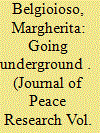

|
|
|
|
|
| Summary/Abstract |
When and why do groups participating in mass dissent choose to initiate terrorist campaigns? I argue that groups involved in civil wars and mass civil resistance might face similar organizational pressures, which encourage the initiation of terrorism due to higher tactical effectiveness. Internal organizational pressure might depend on leaders’ expectations of a decline in followers’ commitment with protracted use of mass tactics. This is likely to motivate leaders to initiate terrorist campaigns to secure organizational survival. External organizational pressures might depend on increasing dissident campaigns’ fragmentation. This intensifies competition making leaders more likely to initiate terrorism so as to establish themselves at the forefront of their movements. The findings provide empirical support consistent with my claims and indicate no significant difference between civil wars and mass civil resistance movements with regards to these effects. Contrary to the common idea that the use of conventional violence should entail a higher willingness to engage in illegal violence against non-combatants, this finding suggests that conflict dynamics affect the decision to initiate terrorism and that terrorist campaigns have a coherent strategic logic across different types of mass dissent.
|
|
|
|
|
|
|
|
|
|
|
|
|
|
|
|
| 3 |
ID:
161550
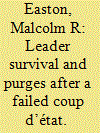

|
|
|
|
|
| Summary/Abstract |
What factors explain variation in the tenure of political leaders who survive a coup d’état? Our main hypothesis is that leaders who survive a coup attempt take the opportunity to purge known and potential rivals while also deterring future coup conspirators. The severity of the purge is also hypothesized to be positively associated with longer post-coup tenures, as potential rivals are eliminated or deterred from future coup attempts. After introducing the topic of the failed coup, and presenting the dataset we developed to measure the level of punishment associated with a failed coup attempt, we offer an analysis of the effect of purges on the survival time of leaders who survive a coup attempt. We find that, conditional on regime type, purging has an effect on lengthening leader tenure, with more severe purges being associated with longer authoritarian tenures. Democratic leaders gain no advantage. Changes in military expenditures do not increase subsequent tenure. We conclude with a discussion of the results as well as what a broader dataset might reveal.
|
|
|
|
|
|
|
|
|
|
|
|
|
|
|
|
| 4 |
ID:
161556
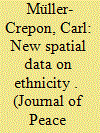

|
|
|
|
|
| Summary/Abstract |
Research on ethnic politics and political violence has benefited substantially from the growing availability of cross-national, geo-coded data on ethnic settlement patterns. However, because existing datasets represent ethnic homelands using aggregate polygon features, they lack information on ethnic compositions at the local level. Addressing this gap, this article introduces the Spatially Interpolated Data on Ethnicity (SIDE) dataset, a collection of 253 near-continuous maps of local ethno-linguistic, religious and ethno-religious settlement patterns in 47 low- and middle-income countries. We create these data using spatial interpolation and machine learning methods to generalize the ethnicity-related information in the geo-coded Demographic and Health Surveys (DHS). For each DHS survey we provide the ethnic, religious and ethno-religious compositions of cells on a raster that covers the respective countries at a resolution of 30 arc-seconds. The resulting data are optimized for use with geographic information systems (GIS) software. Comparisons of SIDE with existing categorical datasets and district-level census data from Uganda and Senegal are used to assess the data’s accuracy. Finally, we use the new data to study the effects of local polarization between politically relevant ethnic groups, finding a positive effect on the risk of local violence such as riots and protests. However, local ethno-political polarization is not statistically associated with violent events pertaining to larger-scale processes such as civil wars.
|
|
|
|
|
|
|
|
|
|
|
|
|
|
|
|
| 5 |
ID:
161548
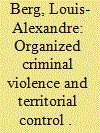

|
|
|
|
|
| Summary/Abstract |
What accounts for geographic variation in organized criminal violence? In Honduras, a country with one of the highest homicide rates in the world, the intensity of violence rivals many civil wars. Yet violent crime varies across cities and neighborhoods. Armed groups seeking to control territory use violence for different purposes, including competing against rivals, coercing residents and state officials, and exploiting the public for profit. Variations in community organization, defined as the density of interpersonal ties and the prevalence of shared expectations for collective action, affect the utility of violence for each of these purposes. Community organization can raise the cost of controlling territory, reduce the benefits of coercive violence, and generate pressure to protect residents from exploitation. These dynamics are examined through a comparison of nine neighborhoods in three of Honduras’s most violent cities, drawing from disaggregated homicide data and ethnographic research. The comparison shows that neighborhoods with denser community organization experienced lower levels of violence. Narrative evidence points to specific ways in which community organization mediates effects of competition among criminal groups and their interaction with state officials. Community characteristics thus affect the way non-state armed actors exercise authority in areas of limited state presence.
|
|
|
|
|
|
|
|
|
|
|
|
|
|
|
|
| 6 |
ID:
161549
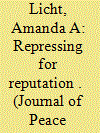

|
|
|
|
|
| Summary/Abstract |
When do leaders use repression? Leadership transitions disrupt the relationship between regime and citizens, introducing uncertainty about whether the state will use force to put down dissent. This shock to the equilibrium level of repression and dissent threatens the survival of new leaders by inviting challenges, incentivizing them to build a deterrent reputation. Investing in repression early allows a rapid re-equilibration, leading to a decrease in the probability of increased repression as a leader gains experience in office. Some leaders, therefore, have a reason to put down dissent early in their tenure to clearly establish a reputation for toughness, one that exists distinct from that of the state or the regime. These dynamics surface only for leaders that break with the prior regime. Those closely linked to the existing order can draw upon an established reputation and need not develop their own. Statistical analyses of changes in repression intensity from 1990 to 2005 reveal strong support for the argument. Breaks with the prior regime produce a short-term increase in repression, but leaders who come to power via such transitions become less likely to change the level of coercion the longer they remain in office. Leaders tied directly to the prior administration exhibit neither tendency.
|
|
|
|
|
|
|
|
|
|
|
|
|
|
|
|
| 7 |
ID:
161555


|
|
|
|
|
| Summary/Abstract |
Barbara Walter’s application of reputation theory to self-determination movements has advanced our understanding of why many separatist movements result in armed conflict. Walter has shown that governments of multi-ethnic societies often respond to territorial disputes with violence to deter similar future demands by other ethnic groups. When governments grant territorial accommodation to one ethnic group, they encourage other ethnic groups to seek similar concessions. However, a number of recent empirical studies casts doubt on the validity of Walter’s argument. We address recent challenges to the efficacy of reputation building in the context of territorial conflicts by delineating the precise scope conditions of reputation theory. First, we argue that only concessions granted after fighting should trigger additional conflict onsets. Second, the demonstration effects should particularly apply to groups with grievances against the state. We then test the observable implications of our conditional argument for political power-sharing concessions. Using a global sample of ethnic groups in 120 states between 1946 and 2013, we find support for our arguments. Our theoretical framework enables us to identify the conditions under which different types of governmental concessions are likely to trigger future conflicts, and thus has important implications for conflict resolution.
|
|
|
|
|
|
|
|
|
|
|
|
|
|
|
|
| 8 |
ID:
161552


|
|
|
|
|
| Summary/Abstract |
The debate on democratic civil peace has centered on three general claims: democracies have a low risk of civil conflict, autocracies have the same low risk of conflict as democracies, and hybrid regimes have the highest conflict risk. We re-evaluate these claims, emphasizing that previous studies have focused on the aggregate categories of regimes, neglecting the role of particular institutional features. We propose focusing on the electoral qualities of regimes, which constitute the core of democracy, and argue that constraints on electoral contestation generate incentives for opposition to use force. Building on this framework, we distinguish between five regime types according to their electoral features – non-electoral autocracies, single-party autocracies, multi-party autocracies, minimalist democracies, and polyarchies – and specify hypotheses regarding the probability of conflict onset in each. In a global statistical analysis spanning 1817–2006 and employing the new Lexical Index of Electoral Democracy (LIED), we find that polyarchies, characterized by unconstrained contestation, have a lower probability of conflict than any other regime type (although minimalist democracies are only slightly more prone to conflict). Subsequently, we find that single- and multi-party autocracies, characterized by non-competitive elections, are more peaceful than non-electoral autocracies. Our analysis also reveals two factors that are particularly associated with civil peace: the presence of (any form of) elections and minimal electoral competition. Overall, our study underscores the importance of focusing on the central attributes of democracy and sheds new light on the relationship between particular regime features (or types) and civil conflict, thereby contributing to the growing efforts in conflict research to disaggregate political regimes.
|
|
|
|
|
|
|
|
|
|
|
|
|
|
|
|
| 9 |
ID:
161547
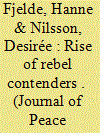

|
|
|
|
|
| Summary/Abstract |
Fragmentation of armed opposition movements through the rise of new rebel groups constitutes a significant challenge to conflict termination and peacebuilding. Yet, the question of why some rebel movements remain cohesive whereas others see a number of contending groups during the course of the armed conflict has received limited attention in existing research. This article addresses this gap by analyzing the determinants of the rise of rebel contenders in intrastate armed conflicts worldwide, 1975–2013. The theoretical framework focuses on barriers to entry, that is, variations in the costs and disadvantages that must be borne by nascent rebel contenders that are not borne to the same extent by incumbent rebel groups. The study proposes that strong social networks underpinning incumbent groups create structural barriers to entry for nascent groups by aggravating challenges of organization building. It further suggests that the interaction between incumbent groups and the government influences strategic barriers to entry as changes in government policies produce windows of opportunity for nascent groups to form. Consistent with these arguments, the study finds that when incumbent groups have strong networks – because rebels either tap into ethnic networks or draw on a leftist ideology – the risk of fragmentation is lower. Furthermore, when the government accommodates groups, through either negotiations or democratic concessions, the risk of fragmentation increases.
|
|
|
|
|
|
|
|
|
|
|
|
|
|
|
|
| 10 |
ID:
161554


|
|
|
|
|
| Summary/Abstract |
We construct a model of the consequences of terrorism on trade, where firms in trading nations face different costs arising from domestic and transnational terrorism. Using a dyadic dataset in a gravity model, we test terrorism’s effects on overall trade, exports, and imports, while allowing for disaggregation by primary commodities and manufactured goods. While domestic and transnational terrorism have marginal or no significant influence on the overall trade of primary products, both types of terrorism significantly reduce the overall trade of manufactured goods. This novel finding for a global sample indicates the avenue by which terrorism reduces trade and suggests why previous global studies that looked at all trade generally found modest impacts. Moreover, both domestic and transnational terrorism have a detrimental effect on manufactured imports. The larger apparent reduction for transnational terrorism is not statistically different from that of domestic terrorism. A more mixed picture characterizes the effect of terrorism on exports. Domestic terrorism reduces manufactured exports and increases primary exports, while transnational terrorism reduces primary exports. Placebo tests support our hypothesized causality.
|
|
|
|
|
|
|
|
|
|
|
|
|
|
|
|
| 11 |
ID:
161551
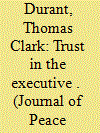

|
|
|
|
|
| Summary/Abstract |
Why is it so hard to get opposing elites to work together rather than to seek partisan gains and/or political survival? While the credible commitment problem is widely known, there are a number of lesser known obstacles to building trust and trustworthiness between opposing elites. This article presents an account of how some of those obstacles interact through time. Common institutional types, particularly winner-takes-all and power-sharing institutions, force trade-offs between agile responses in the short term and medium-term trust between elites, on the one hand, and between trust among elites in the medium term and the adaptability of agreements in the long term, on the other. We call this the ‘time horizon trilemma’. As an alternative approach, we consider a variant on the two-person consulate used by the Roman Republic for more than 400 years as Rome rose to prominence. In our variant, a ‘turn-taking institution’, opposing executives take short alternating turns as the ultimate decisionmaker within one term. We conduct behavioral games in the experimental lab to provide an initial estimate of the impact of these institutional types – winner-takes-all, requiring consensus only, requiring turn-taking only, or requiring both – on overcoming obstacles to agile responses in the short term, trust among elites in the medium term, and adaptability of agreements in the long term. We find that turn-taking is a promising alternative to solving the time horizon trilemma.
|
|
|
|
|
|
|
|
|
|
|
|
|
|
|
|
|
|
|
|
|